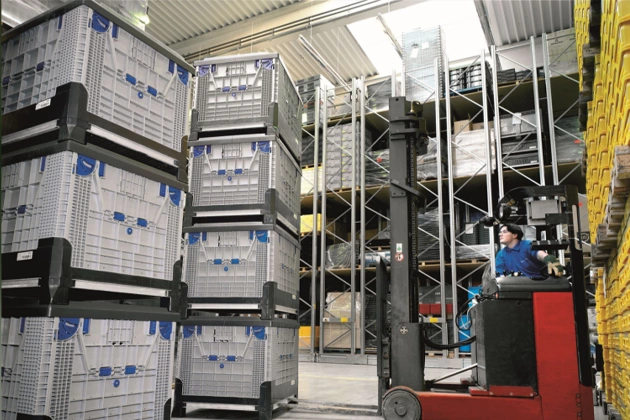Packaging plays a much greater role in automotive manufacturing than a method of transporting components in the complex and highly synchronized environment. It is an operational success factor and it touches on all aspects of operation, depending on the speed, quality control, sustainability, among others.
Plastic packaging from a custom plastic containers manufacturer that is recycled and reusable is taking a leading role in assisting manufacturers to achieve the high requirements required by the automotive industry, as well as fitting into the environmental and economic ambitions.


The Importance of Packaging in Automotive Manufacturing
Automotive packaging solutions play a vital role in dealing with the complexity of automotive production. A vehicle is comprised of thousands of parts, and they are usually supplied all over the world. It is not negotiable to ensure every component comes on time and in an immaculate condition.
Important functions that packaging plays in this respect are:
- Optimization of logistics: Reusable plastic containers contribute to the standardization of work processes, which eliminates errors and delays.
- Just-in-time/ just-in-sequence: Efficient packages allow supporting just-in-time (JIT) and just-in-sequence (JIS) models by allowing faster throughput and less storage space.
- Improving communication: Tagged and coded packaging provides better visual management in production phases.
- Greater automation compatibility: Automation compatibility is an issue of concern because engineered plastic packaging can be integrated with automated material handling systems.
Plastics from a custom plastic containers manufacturer that are recyclable and reusable present a dependable service life in such applications, and their resistance and ability to be tailored make them particularly interesting in repeated use in high-throughput applications.
Enhancing Efficiency Through Tailored Packaging
In automotive production, it is all about efficiency. Recyclable packaging in logistics and reusable plastics, such as those from Utz, are manufactured to fit the specific requirements of automotive processes, saving the manufacturers time, space, and resources.
The advantages of custom plastic packaging are:
- Part-specific designs: Parts are held securely in custom trays, inserts, and containers to avoid damage and misplacement.
- Stackability and modularity: Reusable plastic bins and totes make the best use of warehouse and truck space.
- Labeling and tracking capabilities: Built-in spaces to place barcodes, QR codes, or RFID allow real-time tracking and inventory management.
- Faster handling times: The uniform sizes of the containers enhance compatibility with the robotic systems and forklifts.
The lifecycle of these containers is also long, which implies operational consistency, much-needed in the variation and downtime reduction across production shifts.
Protecting Automotive Components
Auto components are becoming more complicated and delicate. During the pandemic, the automotive industry lost approximately $450 billion due to chip shortages. Whether it is electronics or precision-machined metal components, every product needs custom protection in handling and transportation.
- Plastic packaging, which is recycled and reusable, offers good protection by:
- Durability: Rigid plastics are not easily crushed, bent, or damaged during long supply chains.
- Environmental resistance: Plastic containers protect components against moisture, dust, and high/low temperatures.
- Anti-static: ESD safe plastics help to guard fragile electronics such as control modules and sensors.
- Custom dunnage and inserts: Parts are immobilized by molded plastic interiors to eliminate scratching, abrasion, or breakage.
Such safeguarding characteristics limit the chances of harm and contamination, which is critical in ensuring the continuity of quality and reliability in automotive assembly lines.
Supporting Sustainability in Automotive Manufacturing
The automotive industry has made sustainability one of its key performance indicators. Recyclable packaging in logistics makes a direct contribution to the realization of environmental goals without affecting operational efficiency.
The benefits of sustainability are:
- Waste: Durable containers can avoid disposable packaging and limit the quantity of landfills.
- Material circularity: A substantial number of plastic packaging systems consist of recycled material and can be recycled at the end-of-life.
- Reduced carbon footprint: Light plastic weighs less, and thus less fuel is used in transportation.
- Closed-loop systems: Reusable packaging can be shuttled between plants and suppliers, thereby limiting the number of replenishment ships.
Moreover, converging on reusable plastic containers permits manufacturers to simplify the measurement of sustainability data points, like CO2 savings, waste savings, and lifecycle effects, to internal targets and compliance with regulatory demands.
In Conclusion
Packaging plays a significant role in the manufacturing process of the automotive industry, with effects in the logistics, quality control, environmental responsibility, and cost control. Recyclable packaging materials and reusable packaging have become the packaging industry’s favorite because of their versatility, strength, and compatibility with the circular economy concepts.
These packaging systems provide: when strategically placed, these systems will offer:
- Increased efficiency of handling and storage
- Premium cushioning of fragile/precious parts
- Quantifiable sustainability performance in terms of lower waste and emissions
- Lifecycle cost savings through reusability and long life cycle savings
With the automotive industry gradually going smarter, greener, and more automated in terms of production systems, the recycled and reusable plastic packaging is going to stay one of the driving forces of improvement.

